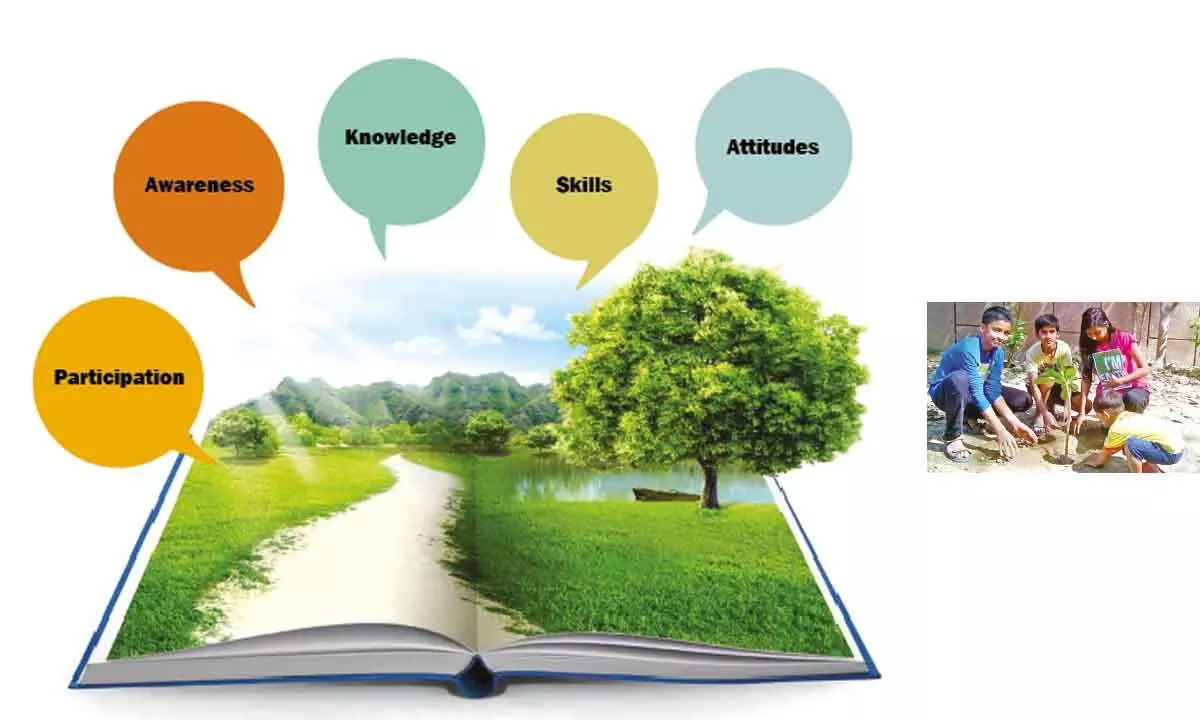Greener Generation: Environmental education in the New Education Policy

Through the implementation of a comprehensive curriculum that emphasises the fundamental principles of ecology, the prudent management of resources, and the adoption of sustainable methodologies, the policy endeavours to equip students with the knowledge and skills necessary to assume the role of conscientious guardians of our planet. The New Education Policy 2023 establishes a transformative framework that serves as the bedrock for a future characterised by environmental consciousness and sustainability.
In the modern age, Environmental Education assumes a pivotal role in moulding the attitudes and behaviours of individuals with regard to the environment. The New Education Policy of 2023 recognises the pressing need for sustainability and has incorporated initiatives to ensure that students receive a comprehensive education that includes both environmental awareness and practical action.
Through the implementation of a comprehensive curriculum that emphasises the fundamental principles of ecology, the prudent management of resources, and the adoption of sustainable methodologies, the policy endeavours to equip students with the knowledge and skills necessary to assume the role of conscientious guardians of our planet. The New Education Policy 2023 establishes a transformative framework that serves as the bedrock for a future characterised by environmental consciousness and sustainability.
Coherently knitted in the course
The incorporation of Environmental Education is central to the New Education Policy 2023, which recognises the critical significance of equipping students with a thorough comprehension of environmental concepts from the earliest stages of their academic journey. This innovative approach transcends the confines of environmental studies as a discrete subject and instead penetrates multiple subjects and grade levels, nurturing a holistic understanding of the complex relationship between humans and the environment.
Under the auspices of the New Education Policy 2023, environmental topics are given their rightful position in essential subjects such as science, geography, and social studies, where they integrate seamlessly with the core curriculum. By integrating environmental content into these disciplines, students are afforded the invaluable opportunity to investigate the interrelationships between the natural world and human activities, thereby enhancing their appreciation for the intricate web of life that sustains our planet.
Practicality has been prioritised
The New Education Policy 2023 acknowledges the transformative force of experiential and hands-on learning in environmental education. The policy actively encourages educators to integrate hands-on pedagogy that enables students to actively engage with real-world environmental challenges. Students are empowered to develop the critical thinking, problem-solving, collaboration, and decision-making skills necessary for navigating complex environmental issues through immersion in practical experiences.
The orchestration of field excursions to ecological reserves, nature parks, and other environmentally significant locations is one of the policy’s main strategies. These comprehensive experiences provide students with the opportunity to directly observe and investigate the rich biodiversity and delicate ecosystems that exist beyond the classroom.
Under the guidance of expert educators or naturalists, students have the opportunity to observe firsthand the interaction between various organisms, the fragility of ecosystems, and the effects of human activity. These field excursions not only enhance students’ knowledge of environmental concepts but also instill in them astonishment, appreciation, and a sense of responsibility towards the natural world.
Interweaving a culture of environmental clubs
At the heart of the New Education Policy 2023 is a sincere acknowledgement of the importance of extracurricular activities and environmental organisations in fostering a deeper understanding of environmental issues among students. The policy actively encourages schools to establish and maintain these platforms, which provide students with unique opportunities to explore environmental topics, collaborate with like-minded peers, and develop essential leadership skills.
Environmental clubs serve as hubs of learning, activism, and creativity, where students can immerse themselves in the exploration of environmental issues.
These clubs provide a safe and supportive space for students to delve into topics of personal interest, engage in research, and actively participate in discussions and debates. By being part of an environmental club, students gain access to a vibrant community of individuals who share their passion for the environment, fostering a sense of belonging and camaraderie.
Teacher training and capacity building
Recognising the pivotal role of educators, the policy emphasises teacher training and capacity building in Environmental Education. Teachers are provided with professional development opportunities to enhance their understanding of environmental issues, teaching methodologies, and the integration of sustainability principles into the curriculum. By equipping teachers with the necessary knowledge and skills, the policy ensures the effective delivery of environmental education to students.
Reimagining the values: Environment and education will be remnant and relevant forever
In conclusion, the enduring relationship between the environment and education remains an indelible and indispensable aspect of human progress. As the world grapples with pressing environmental challenges, the importance of integrating environmental education into the fabric of our educational systems becomes increasingly apparent. The New Education Policy 2023’s emphasis on promoting sustainability initiatives and environmental education paves the way for a future where ecological literacy and responsible stewardship are integral to the education of every student.
(The author is Headmaster, The Lawrence School, Sanawar)








